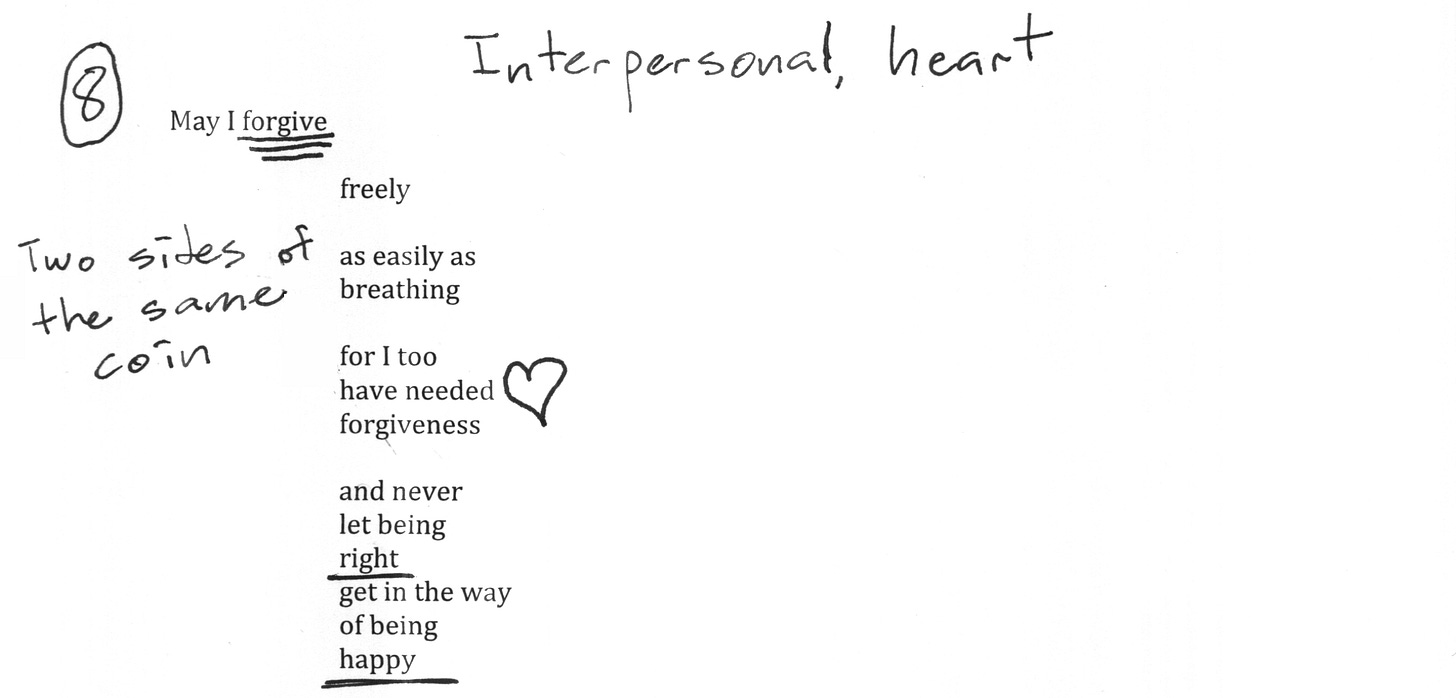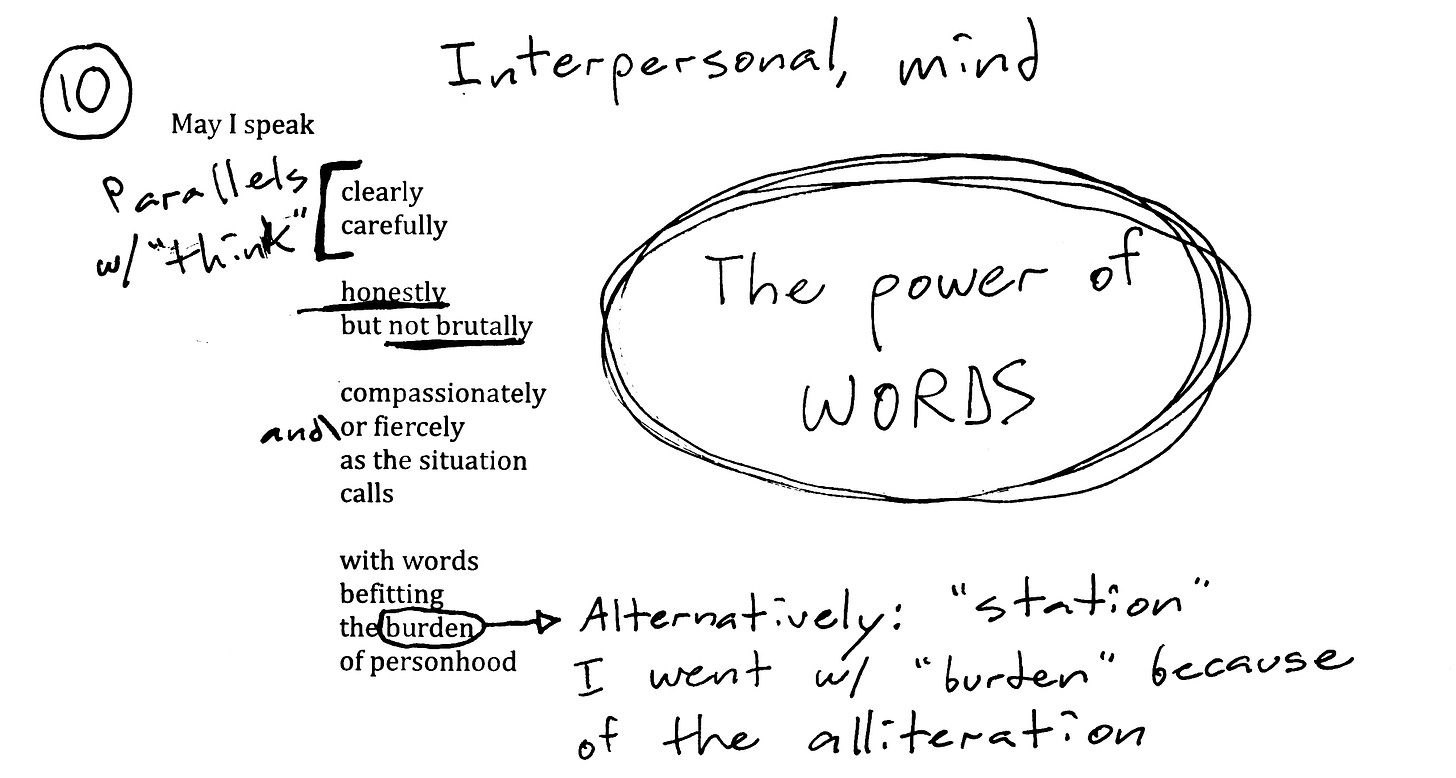Behind the Monster: “Project 2025”
Annotations & Resolutions in a Challenging New Year
Dear Reader,
This poem aside, I do not want to talk about Project 2025—so I’m not going to. Especially not when plenty of writers have done a better job unpacking it than I could. See this piece from Ms. Magazine (that my friend Livia Follet contributed to!) highlighting critical sections of the document, or
’s breakdown of how Project 2025 will impact women and reproductive rights. Both of these are great resources for those who want to stay informed about the anti-feminist legislation that could be coming our way.1At the moment, I’m most interested in how poets are responding. After the election, poet
shared her idea for “a personal Project 2025” on Instagram.2 Then, wrote this beautiful response to Smith’s prompt. I decided to jump on this burgeoning trend! One response to hatred and fear is to look in a different direction—not ignoring it, but consciously committing yourself to love and justice. That is what I hope to do with my “Project 2025.” It is a list of New Year’s resolutions, a prayer, a meditation, and a call to action all at once.As always, you can read the unannotated poem here:
Back in my tarot phase, I liked to do New Year’s readings: twelve cards, one for each month, followed by a thirteenth card to represent the year as a whole. This poem follows that same format. The first line of the stanza summarizes my intention for the year; the twelve indented lines provide specifics. I knew I wanted to start with “May I sleep” because it’s counterintuitive to the typical resolution model. Do more! Work more! Be more! Not this year—this year I’m honoring my need for rest.
Dieting is a common New Year’s resolution, especially for women. This rarely has to do with nutrition or health; instead, it’s about conforming to male-centered beauty standards. The female body as an object. But in a time when our bodies are subjugated to oppressive laws, it’s more important than ever to take care of them. That’s why my “Project 2025” begins in the body, focusing on the physical self. Resolution #2 is less about what I eat and more about how I eat: with intention, gratitude, and pleasure.3
Number 3 is a more typical resolution: this year, we exercise! Again, though, this is a direct response to the legislation of female bodies. It’s not enough to strengthen the spirit; I need to be in my body—in my body. In 2024, I watched many of the older women in my life struggle with pain and immobility. Aging is tough and there’s no running from it, but I want to do what I can to stay physically strong. This is particularly important for writers, who tend to lead sedentary lives. No more sitting at a desk all day! It’s time to celebrate my freedom of movement.
Have I actually exercised yet this year? Have I gone to the gym like I said I would? No comment. (I’ve never claimed to be a perfect person, alright?)
So far, the poem has focused on bodily, internal/intrapersonal goals. Now, we transition: still in the body, but moving toward the external/interpersonal. Patriarchy complicates touch—among everyone, across genders, sexual/romantic or otherwise. Yet touch is a cornerstone of relationship and connection. We need that sweet, sweet oxytocin to thrive. I could have written a whole poem just about the politics of touch (and let’s be honest—I probably will).
Here the poem transitions from the body to the heart, and the boundaries between the intra- and inter-personal thin. This stanza concerns itself with the outward expression of emotion. I wanted “May I laugh” and “May I cry” to parallel each other. It reflects a “ten thousand joys, ten thousand sorrows” mentality—how you can’t have one without the other. I’m trying to accept what it means to have emotions as an adult: happiness is often tinged with sorrow, and vice versa.
Numbers 7 and 8 are where it gets hard. Apologies and forgiveness do not always come easily to me. Yet, I believe that together they are the foundation of love. I love this YouTube video of Stephen Colbert in which a couple in the audience asks him for marriage advice. Immediately, Colbert responds, “Do not hesitate to say, ‘I’m sorry,’ because you don’t lose anything.” And, of course, forgiveness is the other side of that coin.
I fully anticipate my loved ones holding this part of the poem against me in future disagreements. As they should.
“May I think” and “May I speak” embody the structure of the poem at large. I tried to phrase each stanza so that you could read the first line before each section of the indented part to create complete sentences—e.g., May I think clearly, May I think carefully, May I think better of others and myself, etc. That doesn’t work perfectly throughout the entire poem, but it worked well here. May I speak compassionately or fiercely as the situation calls. May I speak with words befitting the burden of personhood.
Additionally, Number 9 specifies an order in which these “May I’s” should occur. Thinking before speaking, thinking before acting, reacting, impacting, etc. There is a reason I placed the “May I’s” in the order I did. We’re moving from the body, to the heart, to the mind. We’re moving from emotion to contemplation to . . .
. . . action . . .
. . . and from action to . . .
. . . creation.
The resolutions in my “Project 2025” are simple. Not basic as in boring, but basic as in the basis of life. 2025, like every year before it, will be complicated. The job of poetry is not to complicate it further, but to strip it down to reveal its simplest, most basic truths. May I sleep, May I eat, May I move, May I touch, May I laugh, May I cry, May I apologize, May I forgive, May I think, May I speak, May I act, May I create—all of which is to say:
Thanks for reading.
Resolutely,
If you like Loose Baggy Monsters, consider leaving a tip! All donations will go toward submission fees for contests and lit mags, helping Jane get her writing into the world.
and/or
I could’ve sworn that she also posted a full poem, but I can’t seem to find it! :( I’ll link it in this post if I do.
Reading recommendation: Pleasure Activism by adrienne marie brown! I have yet to read all of it, but the parts I have read are super thought-provoking.



















